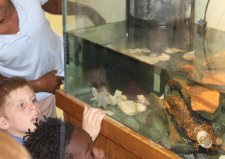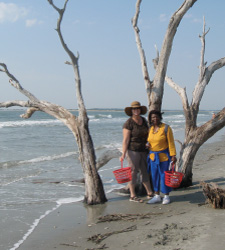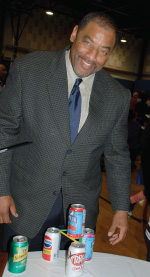COSEE SouthEast 2012 Update
| |  |
| Elementary students observe their new salt water aquarium in the marine science nook |
Ideas are flying fast and furious as early career ocean scientists from University of Georgia, University of South Carolina and University of North Carolina brainstorm outreach ideas with teachers, informal educators and university communications specialists.
The Research Educator Exchange Forum (REEF) was a two-day learning program held in July 2011. Carrie Thomas, North Carolina State University (NCSU), developed the agenda for REEF to be designed to hone communication skills and provide insight to participating scientists about techniques to work with media specialists, formal educators and informal educators. Strategies were presented and tested about the role of COSEE SouthEast (SE), communicating science and broader impacts, outreach opportunities and actual development of outreach programs. Rick Tankersley from COSEE Florida was the keynote speaker, offering well-received advice about presentations to various audiences with emphasis on PowerPoint design.
Each of the nine scientists has developed an outreach plan with the assistance of COSEE SE team members (Angela Bliss for Georgia; Elizabeth Vernon Bell for South Carolina; Terri Kirby Hathaway for North Carolina). Outreach events have occurred in Georgia and North Carolina that extend applications of ocean sciences research. On February 16, 2012, the South Carolina State Museum will host 15 University of South Carolina scientists who will share their career paths and ocean science research with over 100 teachers from across the state during the outreach event, "Science in Action – A Night at the Museum".
 | |
SC Amazing Coast elementary teachers observing island erosion first hand | |
COSEE SE is developing a mentor-coach model for introducing STEM, place-based ocean sciences activities and projects for teachers in elementary schools. The South Carolina Amazing Coast program for grades three, four and five is implemented in two Charleston County elementary schools (one inner city and one more rural) by COSEE SE education specialist Elizabeth Vernon Bell. She has been mentor and coach to the grade teachers in demonstrating inquiry and STEM activities in their classrooms, developing marine science “nooks” in each school, and arranging experiential learning opportunities to explore local coastal habitats. Bell and Pam Van Dyk, the evaluator, have observed that each school has a different culture and therefore requires Bell to modify the effort to meet the specific needs of the teachers in each school.
The loggerhead sea turtle (Caretta caretta) and the diamondback terrapin (Malaclemys terrapin) are being used as “hook” species for the students to learn about their local coastal habitats, address science standards, and interact with marine scientists. Currently, students are partnering with South Carolina Aquarium scientists to take care of two juvenile terrapins, recording daily, weekly and monthly data on water quality and terrapin health. At the end of the 2012 school year, a College of Charleston marine scientist, who is a specialist in diamondback terrapin research, will discuss the data and conclusions with the students.
This spring students will engage in a STEM and inquiry-based project to construct a small floating platform armed with simple instruments to collect selected weather data, such as rainfall, wind speed and direction, and air/water temperature. Since 2008 South East Coastal Ocean Observing Region Association (SECOORA) and COSEE SE have focused on the Basic Observation Buoy (BOB) as a STEM activity for middle and high schools to monitor water quality in quiet waters. Now COSEE SE and SECOORA are developing and testing an appropriate elementary level model, led by COSEE SE staff members Angela Bliss and EV Bell. Progress on BOB can be found on SECOORA and COSEE SE websites. Lisa Adams, assistant professor at Kennesaw State University, is an advisor to COSEE SE efforts to incorporate real-time data collecting for elementary and upper grade students.
| |  |
| Exploring science concepts with parents at high school career day |
The two-day 2010 workshop Broadening Participation in the Ocean Sciences, funded by an
NSF OEDG award to Carrie Thomas of NCSU, gathered key diversity leaders from universities and state/federal agencies in Georgia and the Carolinas. COSEE SE was a partner in recruitment, evaluation and setting the agenda. Speakers from NSF, NOAA, EPA and NASA provided federal perspectives. One objective was to foster regional communication and new funding efforts. An extension of this workshop was inclusion of sessions on marine science careers at the
2011 NC OPT-ED Alliance Day. Over 500 North Carolina middle and high school students attended the event and heard presentations from Drs. John Bane of UNC-CH and Carrie Thomas on opportunities in the ocean sciences. Larry Campbell, UNC-CH, manager of the NC Alliance to Create Opportunity Through Education, will be sharing results from this collaboration at the Ocean Sciences Meeting in February.
COSEE SouthEast got a facelift! On 11-11-11, COSEE SE launched a new webpage. Brittney Marshall and Angela Bliss worked to develop a rich resource and networking tool; we encourage you to peruse the pages, which are full of information from archived and current COSEE SE activities. Utilize the new Contact Us form with any comments, feedback, or suggestions. Be sure to “like” or “share” COSEE SE resources or stories with your coworkers or friends.
The COSEE SE team extends a big "thank you" to Greg Baerg (NASA), the Web Working Group (WWG), and the COSEE Excellence in Networking Tools (ENTs), who provided leadership, assistance and advice with this project.
Visit COSEE SouthEast!

